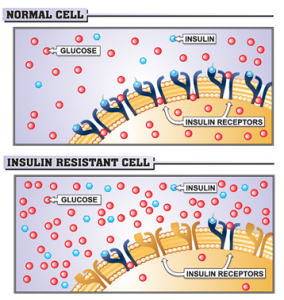Risk of Development of Diabetes: POLYCYSTIC OVARY SYNDROME (PCOS)
It is a condition in which hormonal imbalance in females causes the cyst formation in the ovaries. It is categorized as a major cause of infertility in females.
CYST FORMATION IN OVARIES
Ovaries in females have follicles, which are tiny, fluid-filled sacs that hold the eggs. In normal condition, when an egg gets completely matured, the follicle releases the egg so that it can travel to the uterus for fertilization.
But in women with PCOS, immature follicles bunch together to form large cysts or lumps and the eggs mature within the bunched follicles, but the follicles don’t break open to release them.
As a result, women with PCOS often don’t have menstrual periods or only have periods on occasion. Because the eggs are not released, most have trouble getting pregnant.
CONSEQUENCES OF PCOS
PCOS is a complex disease with long-term consequences. Women with PCOS have to face number of metabolic and other implications. These women are at increased risk of developing:
- Diabetes
- Cardiovascular disease
- Hypertension
- Dyslipidemia
- Endometrial cancer
- Ovarian cancer
- Breast cancer
CONNECTION TO DIABETES 
It is reported that any woman suffering from PCOS is at an increased risk of diabetes. Thus, sometimes diabetes becomes one of the diagnosis parameter of PCOS.
The prevalence of type 2 diabetes in women with PCOS is 7 times higher than other women. This Risk of Development of Diabetes increases to a much higher extent if the women are suffering from obesity too.
In women with PCOS, insulin resistance is the reason behind type 2 diabetes. The disturbed hormonal levels in PCOS interfere in the functioning of β-cells in pancreas. When β-cells get disturbed, they produce impaired amount of insulin which leads to insulin resistance. During insulin resistance, insulin does not work the way it should be. The insulin becomes unable to attach itself upon the insulin receptor site on cells. Due to this, the transfer of blood sugar from blood stream to cell is inhibited. Thus, sugar levels in the blood rises and causes type 2 diabetes.
High insulin levels in blood also reduce the fat breakdown and thus, fat starts to accumulate in the storage units/cells. This causes high cholesterol levels in the body and thus, obesity. This gives rise to more complex form of PCOS.
OUTCOMES OF DIABETES IN PCOS
If diabetes develops in PCOS suffering females, they give rise to following conditions:
- Hyperandrogenism
- Reproductive disorders
- Acne
- Hirsutism
These complications worsen the condition of PCOS.
TREATMENT STRATEGIES
 It has been reported that fenugreek is an effective remedy to treat PCOS patients. It is clinically proven safe and effective in the management of PCOS. It has been observed that Furocyst (fenugreek seed extract) significantly reduced the cyst size, showed complete dissolution of the cysts and reported regular menstrual cycle on completion of the treatment. It also increased insulin sensitizing activity & peripheral utilization of insulin thus helped to manage PCOS.
It has been reported that fenugreek is an effective remedy to treat PCOS patients. It is clinically proven safe and effective in the management of PCOS. It has been observed that Furocyst (fenugreek seed extract) significantly reduced the cyst size, showed complete dissolution of the cysts and reported regular menstrual cycle on completion of the treatment. It also increased insulin sensitizing activity & peripheral utilization of insulin thus helped to manage PCOS.
Regular exercise can reduce the Risk of Development of Diabetes. It is important for keeping the body healthy, especially when it comes to fighting obesity and type 2 diabetes and it has been shown to reduce the symptoms associated with PCOS. Exercise also helps the body to burn excess blood sugar and makes the cells more sensitive to insulin, allowing the body to use insulin more effectively.
A balanced diet that provides whole grains, lean proteins, healthy fats and plenty of fruits and vegetables is a key to reduce the risk of diabetes and manage weight in PCOS females.
Insulin resistance plays a key role in the pathophysiology of this syndrome and thus, use of oral anti-diabetic drugs becomes important. The majority of studies have shown the reduction in the symptoms such as hyperandrogenism and cycle irregularities following the use of oral anti-diabetic drugs.
Women with PCOS are also treated with birth control pills, which helps to regulate menstruation and clear acne.
Women with PCOS have been shown to have higher levels of advanced glycation end products (AGEs) in their blood. AGEs are compounds formed when glucose binds with proteins, and are believed to contribute to certain degenerative diseases and aging. One small studyhas found that lowering dietary AGEs reduce insulin levels in women with PCOS.
Other treatment strategies include:
- Androgen-blocking medications
- Topical anti-hair-growth medications
- Other excess hair treatments
- Treatments for hair loss
- Acne treatments
- Removal of other skin problems
REFERENCES
- http://www.ncbi.nlm.nih.gov/pmc/articles/PMC2683463/
- http://www.diabetes.org/living-with-diabetes/treatment-and-care/women/polycystic-ovarian-syndrome.html?referrer=https://www.google.co.in/?referrer=http://www.diabetes.org/living-with-diabetes/treatment-and-care/women/polycystic-ovarian-syndrome.html?referrer=https://www.google.co.in/
- http://diabetesstopshere.org/2014/09/09/five-things-pcos/
- http://diabetesnsw.com.au/wp-content/uploads/2014/12/DA-28-Polycystic-ovarian-syndrom-and-diabetes.pdf
- http://press.endocrine.org/doi/pdf/10.1210/edrv.18.6.0318
- https://www.askdrshah.com/blog/pcos-diabetes/
- http://www.ncbi.nlm.nih.gov/pubmed/23577418
- http://www.healthline.com/health/diabetes/are-pcos-and-diabetes-connected
- https://furocyst.com/
- http://www.hormone.org/diseases-and-conditions/womens-health/polycystic-ovary-syndrome



